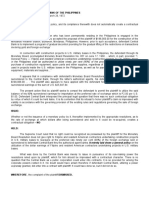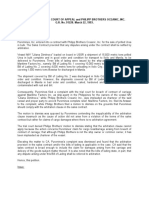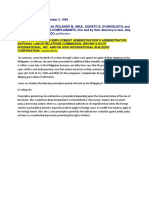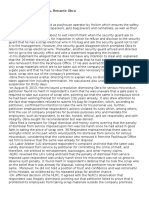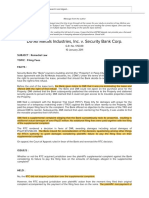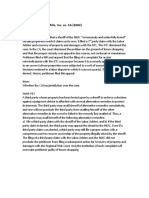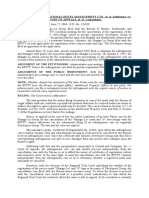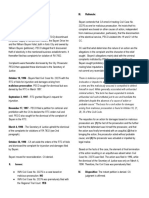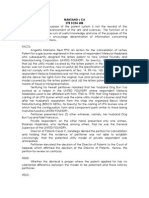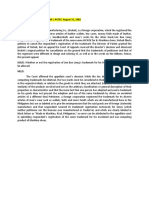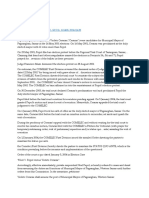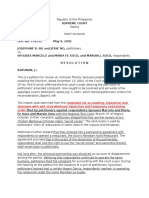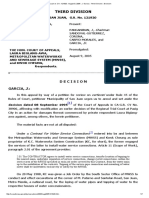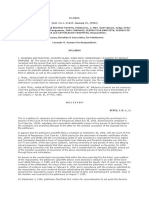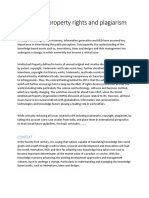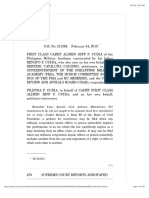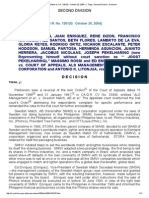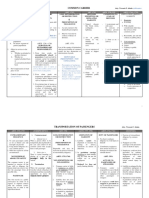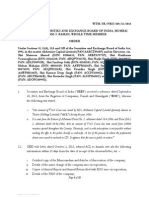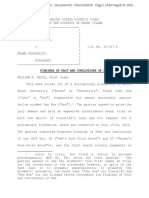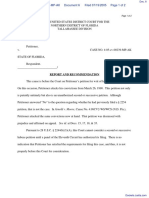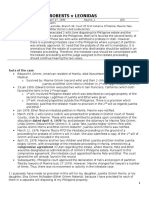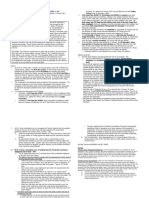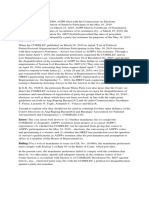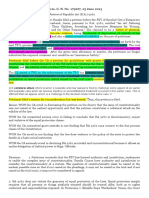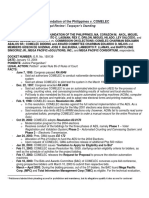116 Mirpuri V CA
116 Mirpuri V CA
Uploaded by
Maui Del RosarioCopyright:
Available Formats
116 Mirpuri V CA
116 Mirpuri V CA
Uploaded by
Maui Del RosarioOriginal Description:
Original Title
Copyright
Available Formats
Share this document
Did you find this document useful?
Is this content inappropriate?
Copyright:
Available Formats
116 Mirpuri V CA
116 Mirpuri V CA
Uploaded by
Maui Del RosarioCopyright:
Available Formats
Mirpuri v CA Meanwhile, in IPC No.
2049, the evidence of both parties were received by the Director
GR No 114508 of Patents. On June 18, 1992, the Director rendered a decision declaring private
Ponente: Puno, J. respondent's opposition barred by res judicata and giving due course to petitioner's
application for registration.
Private respondent questioned this decision before the Court of Appeals. On April 30,
DOCTRINE 1993, the Court of Appeals reversed the Director of Patents finding that IPC No. 686
A "trademark" is defined under R.A. 166, the Trademark Law, as including "any word, was not barred by judgment in IPC No. 2049 and ordered that the case be remanded
name, symbol, emblem, sign or device or any combination thereof adopted and used to the Bureau of Patents for further proceedings.
by a manufacturer or merchant to identify his goods and distinguish them from those
manufactured, sold or dealt in by others." This definition has been simplified in R.A. No. ISSUE
8293, the Intellectual Property Code of the Philippines, which defines a "trademark" as Whether or not petitioner is liable for trademark infringement
"any visible sign capable of distinguishing goods."
HELD
FACTS
On June 15, 1970, one Lolita Escobar, the predecessor-in-interest of petitioner In the case at bar, private respondent anchors its cause of action on the first paragraph
Pribhdas J. Mirpuri, filed an application with the Bureau of Patents for the registration of Article 6bis of the Paris Convention which reads as follows:
of the trademark "Barbizon" for use in brassieres and ladies undergarments. Escobar
alleged that she had been manufacturing and selling these products under the firm "Article 6bis
name "L & BM Commercial" since March 3, 1970. (1) The countries of the Union undertake, either administratively if their legislation so
Private respondent Barbizon Corporation, a corporation organized and doing business permits, or at the request of an interested party, to refuse or to cancel the registration
under the laws of New York, U.S.A., opposed the application. It claimed that: and to prohibit the use, of a trademark which constitutes a reproduction, an imitation,
"The mark BARBIZON of respondent-applicant is confusingly similar to the trademark or a translation, liable to create confusion, of a mark considered by the competent
BARBIZON which opposer owns and has not abandoned. That opposer will be authority of the country of registration or use to be well-known in that country as being
damaged by the registration of the mark BARBIZON and its business reputation and already the mark of a person entitled to the benefits of this Convention and used for
goodwill will suffer great and irreparable injury. That the respondent-applicant's use of identical or similar goods. These provisions shall also apply when the essential part of
the said mark BARBIZON which resembles the trademark used and owned by opposer, the mark constitutes a reproduction of any such well-known mark or an imitation liable
constitutes an unlawful appropriation of a mark previously used in the Philippines and to create confusion therewith.
not abandoned and therefore a statutory violation of Section 4 (d) of Republic Act No. (2) A period of at least five years from the date of registration shall be allowed for
166, as amended." seeking the cancellation of such a mark. The countries of the Union may provide for a
On June 18, 1974, the Director of Patents rendered judgment dismissing the opposition period within which the prohibition of use must be sought.
and giving due course to Escobar's application. This decision became final and on (3) No time limit shall be fixed for seeking the cancellation or the prohibition of the use
September 11, 1974, Lolita Escobar was issued a certificate of registration for the of marks registered or used in bad faith."
trademark "Barbizon." The trademark was "for use in "brassieres and lady's underwear
garments like panties." This Article governs protection of well-known trademarks. Under the first paragraph,
Escobar later assigned all her rights and interest over the trademark to petitioner each country of the Union bound itself to undertake to refuse or cancel the registration,
Pribhdas J. Mirpuri who, under his firm name then, the "Bonito Enterprises," was the and prohibit the use of a trademark which is a reproduction, imitation or translation, or
sole and exclusive distributor of Escobar's "Barbizon" products. Escobar failed to file any essential part of which trademark constitutes a reproduction, liable to create
with the Bureau of Patents the Affidavit of Use of the trademark required under Section confusion, of a mark considered by the competent authority of the country where
12 of Republic Act (R.A.) No. 166, the Philippine Trademark Law. Due to this failure, protection is sought, to be well-known in the country as being already the mark of a
the Bureau of Patents cancelled Escobar's certificate of registration. person entitled to the benefits of the Convention, and used for identical or similar goods.
On May 27, 1981, Escobar reapplied for registration of the cancelled trademark. Mirpuri The essential requirement under Article 6bis is that the trademark to be protected must
filed his own application for registration of Escobar's trademark. Escobar later assigned be "well-known" in the country where protection is sought. The power to determine
her application to herein petitioner and this application was opposed by private whether a trademark is well-known lies in the "competent authority of the country of
respondent. The case was docketed as Inter Partes Case No. 2049 (IPC No. 2049). registration or use." This competent authority would be either the registering authority
Replying to private respondent's opposition, petitioner raised the defense of res if it has the power to decide this, or the courts of the country in question if the issue
judicata. On March 2, 1982, Escobar assigned to petitioner the use of the business comes before a court. IPC No. 2049 raised the issue of ownership of the trademark,
name "Barbizon International." Petitioner registered the name with the Department of the first registration and use of the trademark in the United States and other countries,
Trade and Industry (DTI) for which a certificate of registration was issued in 1987. and the international recognition and reputation of the trademark established by
Forthwith, private respondent filed before the Office of Legal Affairs of the DTI a petition extensive use and advertisement of private respondent's products for over forty years
for cancellation of petitioner's business name. On November 26, 1991, the DTI, Office here and abroad. These are different from the issues of confusing similarity and
of Legal Affairs, cancelled petitioner's certificate of registration, and declared private damage in IPC No. 686. The issue of prior use may have been raised in IPC No. 686
respondent the owner and prior user of the business name "Barbizon International." but this claim was limited to prior use in the Philippines only. Prior use in IPC No. 2049
stems from private respondent's claim as originator of the word and symbol "Barbizon,"
as the first and registered user of the mark attached to its products which have been
sold and advertised worldwide for a considerable number of years prior to petitioner's
first application for registration of her trademark in the Philippines. Indeed, these are
substantial allegations that raised new issues and necessarily gave private respondent
a new cause of action. Res judicata does not apply to rights, claims or demands,
although growing out of the same subject matter, which constitute separate or distinct
causes of action and were not put in issue in the former action.
Respondent corporation also introduced in the second case a fact that did not exist at
the time the first case was filed and terminated. The cancellation of petitioner's
certificate of registration for failure to file the affidavit of use arose only after IPC No.
686. It did not and could not have occurred in the first case, and this gave respondent
another cause to oppose the second application. Res judicata extends only to facts and
conditions as they existed at the time judgment was rendered and to the legal rights
and relations of the parties fixed by the facts so determined. When new facts or
conditions intervene before the second suit, furnishing a new basis for the claims and
defenses of the parties, the issues are no longer the same, and the former judgment
cannot be pleaded as a bar to the subsequent action.
Intellectual and industrial property rights cases are not simple property cases.
Trademarks deal with the psychological function of symbols and the effect of these
symbols on the public at large. Trademarks play a significant role in communication,
commerce and trade, and serve valuable and interrelated business functions, both
nationally and internationally. For this reason, all agreements concerning industrial
property, like those on trademarks and tradenames, are intimately connected with
economic development. Industrial property encourages investments in new ideas and
inventions and stimulates creative efforts for the satisfaction of human needs. They
speed up transfer of technology and industrialization, and thereby bring about social
and economic progress. These advantages have been acknowledged by the Philippine
government itself. The Intellectual Property Code of the Philippines declares that "an
effective intellectual and industrial property system is vital to the development of
domestic and creative activity, facilitates transfer of technology, it attracts foreign
investments, and ensures market access for our products."
You might also like
- Mirpuri vs. CaDocument3 pagesMirpuri vs. CaAlljun SerenadoNo ratings yet
- Churchille Mari vs. Gonzales - DigestDocument4 pagesChurchille Mari vs. Gonzales - DigestDudly Rios67% (3)
- Batchelder V Central Bank of The PHDocument1 pageBatchelder V Central Bank of The PHJm Santos100% (1)
- Class Action Lawsuit Against RobinhoodDocument79 pagesClass Action Lawsuit Against RobinhoodABC Action NewsNo ratings yet
- Mirpuri Vs CADocument1 pageMirpuri Vs CAKenneth SantuyoNo ratings yet
- Puromines, Inc. Vs CADocument2 pagesPuromines, Inc. Vs CAGe-An Moiseah SaludNo ratings yet
- G.R. No. 100898 July 5, 1993Document3 pagesG.R. No. 100898 July 5, 1993eds billNo ratings yet
- BLUE CROSS Vs BLUE CROSS PDFDocument3 pagesBLUE CROSS Vs BLUE CROSS PDFAya BaclaoNo ratings yet
- Schuartz v. CADocument2 pagesSchuartz v. CANN DDLNo ratings yet
- Strongworld vs. Hon. Perello (Jurisdiction)Document2 pagesStrongworld vs. Hon. Perello (Jurisdiction)Elead Gaddiel S. AlbueroNo ratings yet
- Creser Precision Systems, Inc., Petitioner, V. Court of Appeals and Floro International Corp., Respondents.Document4 pagesCreser Precision Systems, Inc., Petitioner, V. Court of Appeals and Floro International Corp., Respondents.Urumi KanzakiNo ratings yet
- 2.spouses Balbin v. Baranda Jr.Document6 pages2.spouses Balbin v. Baranda Jr.John AmbasNo ratings yet
- 26 GTE Directories Corp. v. Sanchez (Consing)Document2 pages26 GTE Directories Corp. v. Sanchez (Consing)Mikhel Beltran100% (1)
- Cadalin V POEA DigestDocument1 pageCadalin V POEA DigestRik TorresNo ratings yet
- NG V People DigestDocument1 pageNG V People DigestRobynne LopezNo ratings yet
- Holcim Philippines Inc vs. ObraDocument2 pagesHolcim Philippines Inc vs. Obrakong pagulayanNo ratings yet
- Case DigestsDocument8 pagesCase DigestsDonna BigorniaNo ratings yet
- Do-All Metals Industries, Inc. v. Security Bank Corp. DigestDocument2 pagesDo-All Metals Industries, Inc. v. Security Bank Corp. DigestKrez DelgadoNo ratings yet
- 29 Rosario Maneja V NLRC and Manila Midtown HotelDocument2 pages29 Rosario Maneja V NLRC and Manila Midtown HotelyzarvelascoNo ratings yet
- Pascual Godines V CADocument4 pagesPascual Godines V CAMarioneMaeThiamNo ratings yet
- Solar Team Entertainment Vs RicafortDocument1 pageSolar Team Entertainment Vs Ricafortmaginoo69No ratings yet
- Hickok Manufacturing V CADocument3 pagesHickok Manufacturing V CAMp CasNo ratings yet
- Briones vs. CADocument2 pagesBriones vs. CAKaitlynne ReyesNo ratings yet
- Yuchengco vs. AngareDocument8 pagesYuchengco vs. AngareKizzy EspiNo ratings yet
- Joseph Regalado Vs de La Pena, G.R. No. 202448Document4 pagesJoseph Regalado Vs de La Pena, G.R. No. 202448MhaliNo ratings yet
- Intellectual Property Cases Law DigestDocument6 pagesIntellectual Property Cases Law DigestLyien HoNo ratings yet
- Pioneer Concrete Philippines Inc vs. TodaroDocument1 pagePioneer Concrete Philippines Inc vs. TodaroAnonymous 5MiN6I78I0No ratings yet
- Duyag Vs InciongDocument2 pagesDuyag Vs Incionghappymabee0% (1)
- Ong Ching Po vs. CADocument6 pagesOng Ching Po vs. CAAngelReaNo ratings yet
- Ip-Ecole de Cuisine Manille Case-DigestedDocument2 pagesIp-Ecole de Cuisine Manille Case-DigestedGenevieve TersolNo ratings yet
- Yupangco VS CaDocument1 pageYupangco VS CaTsuLee YansonNo ratings yet
- Shangri-La International Hotel v. Court of AppealsDocument2 pagesShangri-La International Hotel v. Court of Appealsmystery law manNo ratings yet
- Case Digest No. 23Document3 pagesCase Digest No. 23Nikki P. GabianeNo ratings yet
- Birkenstock V Philippine Shoe ExpoDocument2 pagesBirkenstock V Philippine Shoe ExpoMarion KhoNo ratings yet
- Dela Cruz v. Zabala (A.C. No. 6294. November 17, 2004.)Document2 pagesDela Cruz v. Zabala (A.C. No. 6294. November 17, 2004.)Emmanuel YrreverreNo ratings yet
- Victorias Milling Vs CtaDocument1 pageVictorias Milling Vs CtaKim Lorenzo CalatravaNo ratings yet
- IPLDocument9 pagesIPLDon TiansayNo ratings yet
- Bayani v. PanayDocument1 pageBayani v. PanayLuntian DumlaoNo ratings yet
- Philippine Commercial Int L Bank vs. CA DigestDocument3 pagesPhilippine Commercial Int L Bank vs. CA DigestJewel Ivy Balabag DumapiasNo ratings yet
- Communication Materials v. CADocument2 pagesCommunication Materials v. CAEdren MayoNo ratings yet
- TRANSFIELDDocument2 pagesTRANSFIELDKDNo ratings yet
- Manzano V CADocument2 pagesManzano V CAMartin EspinosaNo ratings yet
- Creser Precision Systems vs. CA CDDocument2 pagesCreser Precision Systems vs. CA CDClarissa Beth Degamo100% (1)
- Gsell Vs VelosoDocument2 pagesGsell Vs VelosoKara AgliboNo ratings yet
- Marvex Commercial Co. Inc. vs. Petra Hawpia & Co.Document4 pagesMarvex Commercial Co. Inc. vs. Petra Hawpia & Co.AJ AslaronaNo ratings yet
- Hickok Mfg. Corp. Vs CA, GR L-44707, August 31, 1982Document1 pageHickok Mfg. Corp. Vs CA, GR L-44707, August 31, 1982Ralph DumaliangNo ratings yet
- Dacuital v. L.M. Camus Engineering Corp. and CamusDocument2 pagesDacuital v. L.M. Camus Engineering Corp. and CamusnabingNo ratings yet
- Jimenez, Et Al V NLRC and JuanatasDocument1 pageJimenez, Et Al V NLRC and Juanatasida_chua80230% (1)
- Canero v. UPDocument1 pageCanero v. UPAlfonso DimlaNo ratings yet
- For Digest (Handwritten)Document11 pagesFor Digest (Handwritten)Feliz Xhanea CanoyNo ratings yet
- Kensonic vs. UnilineDocument2 pagesKensonic vs. Unilineronald100% (1)
- IPL Digests - Week 10Document17 pagesIPL Digests - Week 10Karla Bee100% (1)
- Gsell v. Yap-Jue.Document2 pagesGsell v. Yap-Jue.Rain HofileñaNo ratings yet
- CD 5. Delos Santos Vs Spouses Sarmiento Et AlDocument3 pagesCD 5. Delos Santos Vs Spouses Sarmiento Et AlAnthea Louise RosinoNo ratings yet
- De La Cruz JR Vs NLRC - 145417 - December 11, 2003 - J PDFDocument7 pagesDe La Cruz JR Vs NLRC - 145417 - December 11, 2003 - J PDFRenz R.100% (1)
- Korea Technologies v. LermaDocument1 pageKorea Technologies v. LermaCedricNo ratings yet
- Cathay Pacific Airways Vs CA DigestDocument2 pagesCathay Pacific Airways Vs CA DigestJesa Bayoneta100% (1)
- Pzifer Vs Pharmawealth Case DigestDocument2 pagesPzifer Vs Pharmawealth Case DigestLorraine CalvoNo ratings yet
- REPOL VS COMELEC by Jane Russell SalvanaDocument3 pagesREPOL VS COMELEC by Jane Russell SalvanaJennica Gyrl DelfinNo ratings yet
- NG vs. Sps. SocoDocument3 pagesNG vs. Sps. SocoAJ AslaronaNo ratings yet
- Acuña v. AlcantaraDocument3 pagesAcuña v. AlcantaraAthena VillagonzaloNo ratings yet
- PRIBHDAS J. MIRPURI, Petitioner, vs. COURT OF APPEALS, DIRECTOR OF PATENTS and The BARBIZON CORPORATION, Respondents. G.R. No. 114508Document3 pagesPRIBHDAS J. MIRPURI, Petitioner, vs. COURT OF APPEALS, DIRECTOR OF PATENTS and The BARBIZON CORPORATION, Respondents. G.R. No. 114508Joven Delagente100% (1)
- B15 Mirpuri vs. CA (GARCIA)Document5 pagesB15 Mirpuri vs. CA (GARCIA)Haven GarciaNo ratings yet
- Legal Forms: Acknowledgment and JuratDocument21 pagesLegal Forms: Acknowledgment and JuratGail Fabroa Navarra100% (1)
- Castaneda v. AlemanyDocument3 pagesCastaneda v. AlemanyDaley CatugdaNo ratings yet
- San Juan Vs CA - 121920 - August 9, 2005 - JDocument7 pagesSan Juan Vs CA - 121920 - August 9, 2005 - JnazhNo ratings yet
- Navarro Vs BelloDocument3 pagesNavarro Vs BelloMarco ArponNo ratings yet
- 90323396Document1 page90323396Saif KasmaniNo ratings yet
- Intellectual Property Rights and PlagiarismDocument12 pagesIntellectual Property Rights and PlagiarismAditya GaikwadNo ratings yet
- Ust Faculty Union vs. UstDocument17 pagesUst Faculty Union vs. UstMaria ONo ratings yet
- Cudia v. Superintendent of The PMA - G.R. No. 211362, February 24, 2015Document130 pagesCudia v. Superintendent of The PMA - G.R. No. 211362, February 24, 2015NelNo ratings yet
- DCCO vs. CIR - DigestDocument2 pagesDCCO vs. CIR - Digestremoveignorance100% (1)
- Swedish Match V CA DigestDocument11 pagesSwedish Match V CA Digestmickeysdortega_41120No ratings yet
- Abano Tables TranspoDocument3 pagesAbano Tables TranspoPatrick SantosNo ratings yet
- Interim Order in The Matter of Alchemist Capital Limited.Document21 pagesInterim Order in The Matter of Alchemist Capital Limited.Shyam SunderNo ratings yet
- Procedure For Filing Application in NGTDocument4 pagesProcedure For Filing Application in NGTSimran ChaudharyNo ratings yet
- Doe v. Brown UniversityDocument84 pagesDoe v. Brown UniversityThe College Fix100% (1)
- PLDT Vs NTC DigestDocument2 pagesPLDT Vs NTC DigestAbbeyBandolaNo ratings yet
- ARNOLD v. STATE OF FLORIDA - Document No. 6Document2 pagesARNOLD v. STATE OF FLORIDA - Document No. 6Justia.comNo ratings yet
- Roberts V LeonidasDocument2 pagesRoberts V Leonidas4scribdNo ratings yet
- Smith Bell and Company (Phils.) Inc. v. CADocument2 pagesSmith Bell and Company (Phils.) Inc. v. CAAishaNo ratings yet
- Settlement of CasesDocument10 pagesSettlement of Casess4sahithNo ratings yet
- Supreme Court Judgment On DJS Result 2014Document7 pagesSupreme Court Judgment On DJS Result 2014Latest Laws TeamNo ratings yet
- RIBA Client Guide Architect 2013 EdnV5Document34 pagesRIBA Client Guide Architect 2013 EdnV5Anonymous HBoYn91100% (2)
- Bello V ComelecDocument1 pageBello V ComelecDenDen GauranaNo ratings yet
- Garcia vs. Drilon Case DigestDocument2 pagesGarcia vs. Drilon Case DigestGilbert John LacorteNo ratings yet
- Edna D. Freeman v. Jose Ramon Noguera, Secretary of The Treasury of Puerto Rico, 299 F.2d 767, 1st Cir. (1962)Document3 pagesEdna D. Freeman v. Jose Ramon Noguera, Secretary of The Treasury of Puerto Rico, 299 F.2d 767, 1st Cir. (1962)Scribd Government DocsNo ratings yet
- 320 KVA D.G. Set Along With Its AccessoriesDocument4 pages320 KVA D.G. Set Along With Its AccessorieseinsteinevNo ratings yet
- Corpus Vs CuadernoDocument2 pagesCorpus Vs CuadernoGia DimayugaNo ratings yet
- (03.D.02.09) Information Technology Foundation of The Philippines V COMELECDocument5 pages(03.D.02.09) Information Technology Foundation of The Philippines V COMELECLenvicElicerLesiguesNo ratings yet


